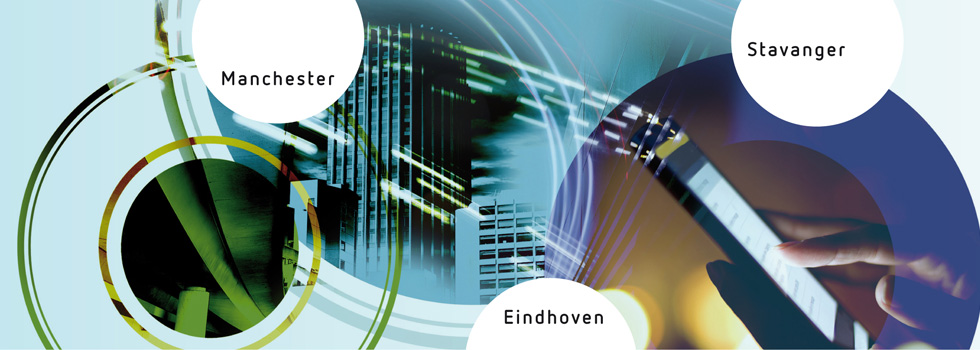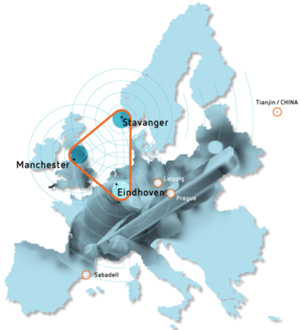
Triangulum



A blueprint for Smart Cities
Cutting-edge concepts for smart district development are already emerging as part of European project TRIANGULUM. Project partners elaborating and implementing solutions for this, not just in theory, but with the clear objective of implementing these ideas within three years in Manchester, Eindhoven and Stavanger and then transferring them to the cities of Leipzig, Sabadell and Prague.
The core of the smart city plan is a replicable smart city framework and an ICT architecture to connect and coordinate the different technologies in the city.
Three pioneering lighthouse cities
The plans for the Dutch city of Eindhoven (Netherlands) show how this can be achieved in practice. Among other things, the municipality focuses on electric mobility. The idea is that ICT solutions enable residents to access various areas of the infrastructure, such as to book electric car-sharing vehicles or to use intelligent parking space concepts. Sensors in lanterns, for example, will (among other things) record motion data to allow the monitoring and management of road lighting, public transport or car-sharing offers. This infrastructure will also form an integral part of the Phillips Headquarters' former industrial area, where numerous start-ups, with the support of Triangulum project partners, are designing the solutions for the cities of the future.
Stavanger (Norway) has the highest density of electric vehicles in Europe. This and the existing high-speed ICT infrastructures form the basis for better networking of energy and mobility solutions. In addition, companies, residents, research facilities and physicians are to be consistently linked via IT networks in order to improve planning, use more efficient energy, and even provide medical remote diagnosis. One of the driving forces here is the municipal energy provider, which is now generating more revenue from the provision of data and Internet services as well as infrastructure than from the electricity business.
In Manchester (England), the Corridor student district, which has around 72,000 students, is to be transformed into a smart city district, including the renovation of the historic buildings. In addition, an autonomous "virtual" energy network is in the planning, which supplies the entire city quarter with heat and electricity. The reuse of existing structures promotes the energy conservation concept through building renovation. As part of the area, an alternative mobility concept is implemented for Oxford Street, one of the country's most popular roads, which uses environmentally friendly forms of transport.
At a later stage, the partners want to transfer the developed, functioning and appropriate solutions to Leipzig, Prague (Czech Republic) and Sabadell (Spain). The project was created from the Fraunhofer-Gesellschaft's Morgenstadt initiative, is coordinated by the Fraunhofer IAO and supported by the Steinbeis-Europa-Zentrum. The European Commission voted it the lead project for its "Smart Cities and Communities" initiative and 23 interdisciplinary partners from municipalities, science and industry are involved in the project.
Further information
Triangulum Newsletter
Here you can find the current newsletter of the Triangulum project as pdf.